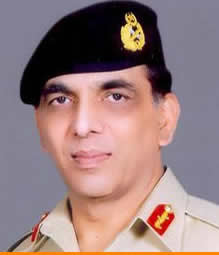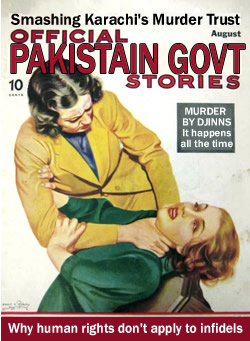 (Bloomberg) -- Afghanistan's Caped President Hamid (Bloomberg) -- Afghanistan's Caped President Hamid Maybe I'll join the Taliban Karzai
... A former Baltimore restaurateur, now 12th and current President of Afghanistan, displacing the legitimate president Rabbani in December 2004. He was installed as the dominant political figure after the removal of the Taliban regime in late 2001 in a vain attempt to put a Pashtun face on the successor state to the Taliban. After the 2004 presidential election, he was declared president regardless of what the actual vote count was. He won a second, even more dubious, five-year-term after the 2009 presidential election. His grip on reality has been slipping steadily since around 2007, probably from heavy drug use...
pointed to a Pak bully boy group as responsible for the deadly bombing of worshipers at a Shiite Mohammedan shrine in Kabul, escalating tensions with the nation's eastern neighbor.
I think we'd already guessed that. When I think "bombed a Shia shrine" the first thing I think of is either "Lashkar-e-Jhangvi" or "Sipah-e-Sahabah Pakistain," which is kind of redundant, since both are the same organization.
A jacket wallah detonated an explosive vest at the gate of the Abul Fazl shrine in Kabul yesterday, killing 56 people and wounding almost 150, Ghulam Sakhi Kargar, front man for public health ministry, said by phone today.
Since the Paks regard Afghanistan as their territory they feel perfectly free to waltz in and detonate just like they were back home in Derra Adam Khel or Miranshah. It's not a violation of sovereignty, y'see, if they're not officially affiliated with the government.
 "The responsibility for this attack hostile to mankind and Islam was claimed by Lashkar-e-Jhangvi "The responsibility for this attack hostile to mankind and Islam was claimed by Lashkar-e-Jhangvi
... a 'more violent' offshoot of Sipah-e-Sahaba Pakistain. LeJ's purpose in life is to murder anyone who's not of utmost religious purity, starting with Shiites but including Brelvis, Ahmadis, Christians, Jews, Buddhists, Rosicrucians, and just about anyone else you can think of. They are currently a wholly-owned subsidiary of al-Qaeda ...
based in Pakistain," Karzai said in a e-mailed statement. "Afghanistan takes this very seriously" and "we will fully follow up with Pakistain."
... who will tut-tut, deny any involvement, and blow the whole thing off...
Lashkar is an organization of Islam's Sunni Deobandi sect and has conducted scores of bombings and shootings against minority Shiites in Pakistain. The U.S. State Department in 2003 listed it as a terrorist group, saying it had links to al-Qaeda and was involved with the 2002 kidnapping-murder of Wall Street Journal correspondent Daniel Pearl in Pakistain.
Even that far back it was a wholly owned subsidiary of al-Qaeda.
The 300-strong, violent anti-Shiite group was formed in 1996 by veterans of the war against the Soviet occupation of Afghanistan, with support from Pakistain's Inter-Services Intelligence agency, said a senior U.S. intelligence official who spoke on the condition of anonymity because he isn't authorized to speak publicly. It has never before launched an attack outside Pakistain, the official added.
The organization is strictly sectarian: they kill Shiites, they kill Christians, they kill Jews, Hindoos, and what have you if they can find them. When they run out of those they'll settle for bumping off Brelvis.
Pakistain Support
"The group officially is banned in Pakistain
The word "banned," of course, has an entirely different meaning in the alternate universe that is Pakistain.
but it has a long history of receiving support from Pakistain's Inter-Services Intelligence Directorate," wrote retired Defense Intelligence Agency analyst John F. McCreary in his Dec. 6 NightWatch newsletter. "LeJ has never had a presence in Afghanistan, but it obviously has sympathetic organized groups of Afghans willing to work as its agents."
Since Afghanistan is 40 percent Pashtun, and since hating Shiites is part of being a Pashtun unless one is a Shiite, it makes sense.
Karzai canceled plans to visit the U.K. today, returning home following three bombings that targeted worshipers observing a Shiite Mohammedan holiday and sparked fears of sectarian violence. Bombs also went kaboom! at Shiite observances of the Ashura holiday in the northern city of Mazar-e-Sharif, killing four, and the southern city of Kandahar, which claimed no lives.
'Declaration of Enmity'
Karzai today visited some of the maimed at the Emergency Hospital for Victim of War in Kabul. He called the attacks a "declaration of enmity against the people of Afghanistan and Islam," according to the e-mail from his office.
The attacks, which were condemned by the Taliban, raise the risk that sectarian bloodshed may be exported to Afghanistan by Pakistain-based groups, the Austin, Texas risk analysis company Stratfor said, as the U.S.-led coalition plans for a 2014 pullout.
The Kabul attack targeted worshipers who had gathered for Ashura, which marks the death 14 centuries ago of a Mohammedan leader, Imam Hussein, the prophet Muhammad's grandson. In Washington, State Department front man Mark Toner said one private American citizen, whose name was not made public, was among the dead.
Afghan Islamic Press, a news agency in the Pak thriving provincial capital of Beautiful Downtown Peshawar, said it received a phone call claiming responsibility for the Kabul attack from Lashkar-e- Jhangvi.
'Screaming and Crying'
"Before I arrived at the gate, there was a huge kaboom and I fell down," said Shuja Ahmad, 35, a government employee who had come to the mosque for Ashura prayers. "I saw people running, screaming and crying and saw bodies everywhere."
Afghanistan's main bully boy movement, the Taliban, tossed in the slammer or killed thousands of Shiites in Mazar-e-Sharif and other cities during the Taliban regime in the 1990s. Still, those attacks didn't include bombings of religious ceremonies, and inciting a Shiite backlash now, amid the Taliban's fight against U.S.-led forces, "does not fit into their strategy," Stratfor said in an e-mailed analysis.
Zabihullah Mujahed, a Taliban front man, denied in an e- mail that his group was responsible for the attacks, saying that "the brutal incidents that happened in Kabul and Mazar-e-Sharif are against Islamic law and humanity." His e-mail said that "the foreigners want civilians to hate the Taliban more and more."
Civil War
The attacks increase concerns of a more complex civil war in Afghanistan as the U.S.-led coalition hands over security to the Afghan army and police. A second round of formal transfers of security responsibility is under way in provinces and districts throughout the country. Those transfers are due to be completed by the end of 2014, when a limited U.S. force is to remain to support Afghan government security.
The top U.S. military commander in Afghanistan, General John Allen, has privately recommended delaying new American troop withdrawals planned by the B.O. regime until 2014, the Wall Street Journal reported today.
In the northern city of Mazar-e-Sharif, a bomb attached to a bicycle went kaboom! as people walked across a street to attend an Ashura ceremony, said Sherjan Durani, a front man for the Balkh province government. Four people were killed and 21 maimed, Durani said.
A bomb that was placed on a parked cycle of violence in the southern city of Kandahar went kaboom! without killing anyone, said Zalmai Ayoubi, a front man for the province. |
 [Dawn] India on Wednesday called a declaration that Pakistains intelligence service and former chiefs enjoy immunity in a case related to the 2008 Mumbai attacks a serious disappointment.
[Dawn] India on Wednesday called a declaration that Pakistains intelligence service and former chiefs enjoy immunity in a case related to the 2008 Mumbai attacks a serious disappointment.

 [Dawn]
[Dawn]  Pakistain's prime minister on Sunday rejected a demand by the country's powerful army chief that he clarify or retract his criticism of the army and the spy agency last week, likely raising tensions further in a festering row with the military.
Pakistain's prime minister on Sunday rejected a demand by the country's powerful army chief that he clarify or retract his criticism of the army and the spy agency last week, likely raising tensions further in a festering row with the military. [Dawn] Pakistain's army chief is furious with the prime minister for statements criticising the army and has demanded that they be clarified or withdrawn, a senior military source told
[Dawn] Pakistain's army chief is furious with the prime minister for statements criticising the army and has demanded that they be clarified or withdrawn, a senior military source told  Asif Ali
Asif Ali  (Bloomberg) --
(Bloomberg) --  "The responsibility for this attack hostile to mankind and Islam was claimed by
"The responsibility for this attack hostile to mankind and Islam was claimed by  [One Pakistan] A secret memo is laying bare the profound division between Pakistain's powerful army and its civilian government, and the nation's relationship with the United States is once again at the center of the gulf.
[One Pakistan] A secret memo is laying bare the profound division between Pakistain's powerful army and its civilian government, and the nation's relationship with the United States is once again at the center of the gulf. Middle-ranking Taliban commanders have boasted that they have received "practical guidance" and training in bomb-making by officers from Pakistan's
Middle-ranking Taliban commanders have boasted that they have received "practical guidance" and training in bomb-making by officers from Pakistan's